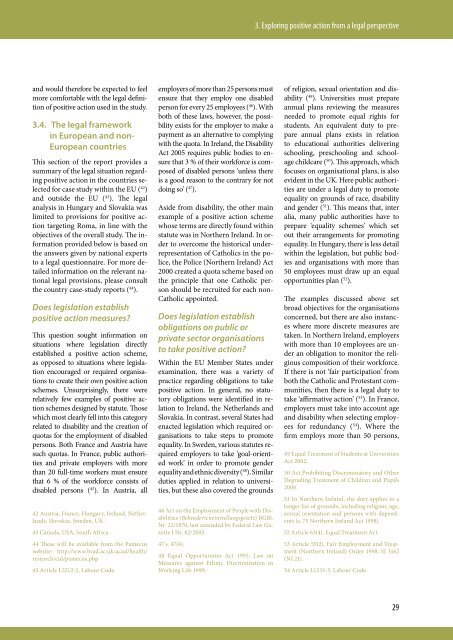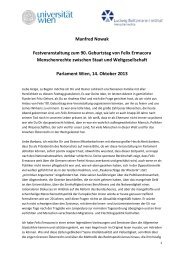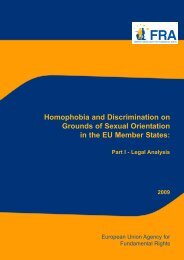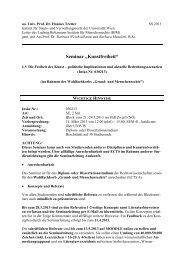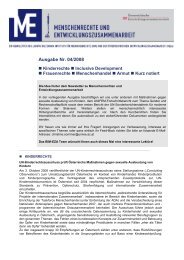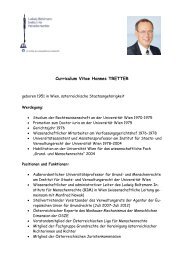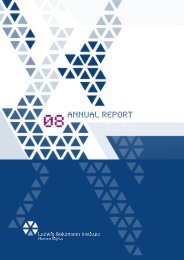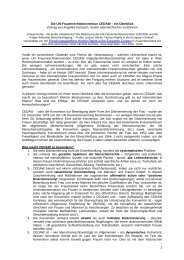International perspectives on positive action measures - European ...
International perspectives on positive action measures - European ...
International perspectives on positive action measures - European ...
Create successful ePaper yourself
Turn your PDF publications into a flip-book with our unique Google optimized e-Paper software.
and would therefore be expected to feel<br />
more comfortable with the legal definiti<strong>on</strong><br />
of <strong>positive</strong> acti<strong>on</strong> used in the study.<br />
3.4. The legal framework<br />
in <strong>European</strong> and n<strong>on</strong>-<br />
<strong>European</strong> countries<br />
This secti<strong>on</strong> of the report provides a<br />
summary of the legal situati<strong>on</strong> regarding<br />
<strong>positive</strong> acti<strong>on</strong> in the countries selected<br />
for case study within the EU ( 42 )<br />
and outside the EU ( 43 ). The legal<br />
analysis in Hungary and Slovakia was<br />
limited to provisi<strong>on</strong>s for <strong>positive</strong> acti<strong>on</strong><br />
targeting Roma, in line with the<br />
objectives of the overall study. The informati<strong>on</strong><br />
provided below is based <strong>on</strong><br />
the answers given by nati<strong>on</strong>al experts<br />
to a legal questi<strong>on</strong>naire. For more detailed<br />
informati<strong>on</strong> <strong>on</strong> the relevant nati<strong>on</strong>al<br />
legal provisi<strong>on</strong>s, please c<strong>on</strong>sult<br />
the country case-study reports ( 44 ).<br />
Does legislati<strong>on</strong> establish<br />
<strong>positive</strong> acti<strong>on</strong> <strong>measures</strong>?<br />
This questi<strong>on</strong> sought informati<strong>on</strong> <strong>on</strong><br />
situati<strong>on</strong>s where legislati<strong>on</strong> directly<br />
established a <strong>positive</strong> acti<strong>on</strong> scheme,<br />
as opposed to situati<strong>on</strong>s where legislati<strong>on</strong><br />
encouraged or required organisati<strong>on</strong>s<br />
to create their own <strong>positive</strong> acti<strong>on</strong><br />
schemes. Unsurprisingly, there were<br />
relatively few examples of <strong>positive</strong> acti<strong>on</strong><br />
schemes designed by statute. Those<br />
which most clearly fell into this category<br />
related to disability and the creati<strong>on</strong> of<br />
quotas for the employment of disabled<br />
pers<strong>on</strong>s. Both France and Austria have<br />
such quotas. In France, public authorities<br />
and private employers with more<br />
than 20 full-time workers must ensure<br />
that 6 % of the workforce c<strong>on</strong>sists of<br />
disabled pers<strong>on</strong>s ( 45 ). In Austria, all<br />
42 Austria, France, Hungary, Ireland, Netherlands,<br />
Slovakia, Sweden, UK.<br />
43 Canada, USA, South Africa.<br />
44 These will be available from the Pamecus<br />
website: http://www.brad.ac.uk/acad/health/<br />
research/cid/pamecus.php<br />
45 Article L5212-2, Labour Code.<br />
employers of more than 25 pers<strong>on</strong>s must<br />
ensure that they employ <strong>on</strong>e disabled<br />
pers<strong>on</strong> for every 25 employees ( 46 ). With<br />
both of these laws, however, the possibility<br />
exists for the employer to make a<br />
payment as an alternative to complying<br />
with the quota. In Ireland, the Disability<br />
Act 2005 requires public bodies to ensure<br />
that 3 % of their workforce is composed<br />
of disabled pers<strong>on</strong>s ‘unless there<br />
is a good reas<strong>on</strong> to the c<strong>on</strong>trary for not<br />
doing so’ ( 47 ).<br />
Aside from disability, the other main<br />
example of a <strong>positive</strong> acti<strong>on</strong> scheme<br />
whose terms are directly found within<br />
statute was in Northern Ireland. In order<br />
to overcome the historical underrepresentati<strong>on</strong><br />
of Catholics in the police,<br />
the Police (Northern Ireland) Act<br />
2000 created a quota scheme based <strong>on</strong><br />
the principle that <strong>on</strong>e Catholic pers<strong>on</strong><br />
should be recruited for each n<strong>on</strong>-<br />
Catholic appointed.<br />
Does legislati<strong>on</strong> establish<br />
obligati<strong>on</strong>s <strong>on</strong> public or<br />
private sector organisati<strong>on</strong>s<br />
to take <strong>positive</strong> acti<strong>on</strong>?<br />
Within the EU Member States under<br />
examinati<strong>on</strong>, there was a variety of<br />
practice regarding obligati<strong>on</strong>s to take<br />
<strong>positive</strong> acti<strong>on</strong>. In general, no statutory<br />
obligati<strong>on</strong>s were identified in relati<strong>on</strong><br />
to Ireland, the Netherlands and<br />
Slovakia. In c<strong>on</strong>trast, several States had<br />
enacted legislati<strong>on</strong> which required organisati<strong>on</strong>s<br />
to take steps to promote<br />
equality. In Sweden, various statutes required<br />
employers to take ‘goal-oriented<br />
work’ in order to promote gender<br />
equality and ethnic diversity ( 48 ). Similar<br />
duties applied in relati<strong>on</strong> to universities,<br />
but these also covered the grounds<br />
46 Act <strong>on</strong> the Employment of People with Disabilities<br />
(Behinderteneinstellungsgesetz) BGBl.<br />
Nr. 22/1970, last amended by Federal Law Gazette<br />
I Nr. 82/2005.<br />
47 s. 47(4).<br />
48 Equal Opportunities Act 1991; Law <strong>on</strong><br />
Measures against Ethnic Discriminati<strong>on</strong> in<br />
Working Life 1999.<br />
3. Exploring <strong>positive</strong> acti<strong>on</strong> from a legal perspective<br />
of religi<strong>on</strong>, sexual orientati<strong>on</strong> and disability<br />
( 49 ). Universities must prepare<br />
annual plans reviewing the <strong>measures</strong><br />
needed to promote equal rights for<br />
students. An equivalent duty to prepare<br />
annual plans exists in relati<strong>on</strong><br />
to educati<strong>on</strong>al authorities delivering<br />
schooling, preschooling and schoolage<br />
childcare ( 50 ). This approach, which<br />
focuses <strong>on</strong> organisati<strong>on</strong>al plans, is also<br />
evident in the UK. Here public authorities<br />
are under a legal duty to promote<br />
equality <strong>on</strong> grounds of race, disability<br />
and gender ( 51 ). This means that, inter<br />
alia, many public authorities have to<br />
prepare ‘equality schemes’ which set<br />
out their arrangements for promoting<br />
equality. In Hungary, there is less detail<br />
within the legislati<strong>on</strong>, but public bodies<br />
and organisati<strong>on</strong>s with more than<br />
50 employees must draw up an equal<br />
opportunities plan ( 52 ).<br />
The examples discussed above set<br />
broad objectives for the organisati<strong>on</strong>s<br />
c<strong>on</strong>cerned, but there are also instances<br />
where more discrete <strong>measures</strong> are<br />
taken. In Northern Ireland, employers<br />
with more than 10 employees are under<br />
an obligati<strong>on</strong> to m<strong>on</strong>itor the religious<br />
compositi<strong>on</strong> of their workforce.<br />
If there is not ‘fair participati<strong>on</strong>’ from<br />
both the Catholic and Protestant communities,<br />
then there is a legal duty to<br />
take ‘affirmative acti<strong>on</strong>’ ( 53 ). In France,<br />
employers must take into account age<br />
and disability when selecting employees<br />
for redundancy ( 54 ). Where the<br />
firm employs more than 50 pers<strong>on</strong>s,<br />
49 Equal Treatment of Students at Universities<br />
Act 2002.<br />
50 Act Prohibiting Discriminatory and Other<br />
Degrading Treatment of Children and Pupils<br />
2006.<br />
51 In Northern Ireland, the duty applies to a<br />
l<strong>on</strong>ger list of grounds, including religi<strong>on</strong>, age,<br />
sexual orientati<strong>on</strong> and pers<strong>on</strong>s with dependents<br />
(s. 75 Northern Ireland Act 1998).<br />
52 Article 63(4), Equal Treatment Act.<br />
53 Article 55(2), Fair Employment and Treatment<br />
(Northern Ireland) Order 1998, SI 3162<br />
(NI 21).<br />
54 Article L1233-5, Labour Code.<br />
29


